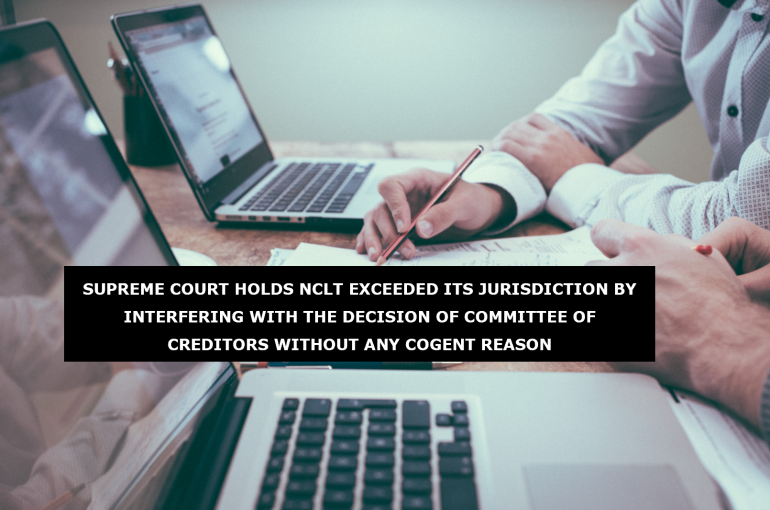SUPREME COURT HOLDS NCLT EXCEEDED ITS JURISDICTION BY INTERFERING WITH THE DECISION OF COMMITTEE OF CREDITORS WITHOUT ANY COGENT REASON
In a recent case of Ramkrishna Forgings Limited Vs Ravindra Loonkar, Resolution Professional of ACIL Limited and Committee of Creditors of ACIL Ltd. Civil Appeal No.1527 of 2022, a two Judge Bench of the Supreme Court comprising of Justice Vikram Nath and Justice Ahsanuddin Amanullah passed a Judgment dated 21-11-2023 and held that the Hon’ble National Company Law Tribunal, Principal Bench, New Delhi (NCLT) exceeded its jurisdiction by interfering with the decision of the Committee of Creditors (CoC) of approval of the Resolution Plan for the Corporate Debtor.
Facts
(i) In the present case, one, ACIL Limited, the Corporate Debtor was undergoing Corporate Insolvency Resolution Process (CIRP) before the Hon’ble NCLT Principal Bench in IDBI Bank Limited Vs ACIL Limited CP(IB) No.170(PB)/2018.
(ii) In the said matter, one, Mr. Ravindra Loonkar, the Resolution Professional (RP) of the Corporate Debtor filed an Application bearing CA/1636/2019 seeking approval of a Resolution Plan for the Corporate Debtor, which was submitted by one, Ramkrishna Forgings Ltd. (Resolution Applicant) before the CoC.
(iii) The NCLT noted that (a) the total amount of debt of the Corporate Debtor was Rs. 1761.70 Crores, (b) the fair value of its assets was valued at Rs. 130.50 Crores and (c) the liquidation value was valued at Rs. 101.7 Crores. However, the amount that would be realised if the Resolution Plan is approved would be only Rs. 129.75 Crores.
(iv) Thus, the NCLT observed that (a) the Resolution Applicant was bidding with an amount very close to that of the fair value of the assets of the Corporate Debtor, (b) there would be a 94.25% haircut in the debt to be settled, if the Resolution Plan is approved and (c) additionally, the fair value of the assets did not seem to have been projected properly.
(v) Hence, the NCLT, vide Order dated 01-09-2021, directed for revaluation of the assets of the Corporate Debtor by experts under the supervision of the Official Liquidator, Ministry of Corporate Affairs, in-charge of the particular area in whose jurisdiction the Corporate Debtor was situated. As a result, the Application seeking approval of Resolution Plan was kept in abeyance and the Official Liquidator was directed to provide the exact valuation details in three weeks period.
(vi) Aggrieved by the NCLT Order dated 01-09-2021 that kept the Application seeking approval of Resolution Plan in abeyance, the Resolution Professional filed an Appeal bearing Company Appeal (AT)(Ins) No. 1034 of 2021 and the Resolution Applicant filed Company Appeal (AT) (Insolvency) No. 845 of 2021 before the Hon’ble National Company Law Appellate Tribunal (NCLAT) under Section 61 of the Insolvency and Bankruptcy Code 2016 (IBC) (Appeals and Appellate Authority).
(vii) The NCLAT, vide Order dated 19-01-2022, upheld the NCLT Order dated 01-09-2021 that kept the Application seeking approval of Resolution Plan in abeyance, on the following grounds:
5….“the Adjudicating Authority is not a rubber stamp, he has to satisfy himself within the boundary of the provisions of the Code and the law laid down. If some suspicion arises on hair cut of 94 to 99%, it has to satisfy itself.
7… No doubt, it is a settled law that commercial wisdom of the ‘Committee of Creditors’ (CoC) is ‘supreme’ and cannot be interfered in a normal circumstance but when ‘figures of crore’ are emerging stagewise then there is no harm to look at the Expert opinion which the Adjudicating Authority in this case has asked for.”
Supreme Court
Aggrieved by the NCLAT Order dated 19-01-2022, the Resolution Applicant filed Civil Appeal No. 1527 of 2022 before the Supreme Court under Section 62 of IBC. The Apex Court, vide Order dated 21-11-2023, made the following observations:
1) That in the present case, the RP had duly complied with the statutory requirement of involving two approved valuers for giving reports about the fair market value and liquidation value of the assets of the Corporate Debtor and most importantly, the reports of both the valuers were not in great variance.
2) Further, the RP and/or the CoC did not raise any objection regarding the deficiency / irregularity, if any, with respect to the Resolution Plan submitted by the Appellant-Resolution Applicant.
3) That the Supreme Court has in its earlier decisions observed as follows:
(i) “the CoC’s decision is not to be subjected to unnecessary judicial scrutiny and intervention.”
(ii) “the CoC’s commercial analysis ought not to be qualitatively examined.”
(iii) “the jurisdiction of the adjudicating authority and the appellate authority cannot extend into entering upon merits of a business decision made by a requisite majority of the CoC in its commercial wisdom.”
(iv) Hence, unless the resolution plan has violated Section 30 IBC (Submission of resolution plan) and Section 31 of IBC (Approval of resolution plan), it is not correct in law to interfere with decisions of CoC, taken on the basis of “commercial wisdom”.
(4) That in the present case, there was no reasonable ground for the NCLT to presume that (i) the hair-cut would be about 94.25% and (ii) the fair value of the assets had not been projected in a proper manner. Thus, the NCLT was not justified in directing the Official Liquidator to reevaluate the assets of the Corporate Debtor.
Conclusion
Therefore, based on the aforesaid observations, the Apex Court held that the NCLT exceeded its jurisdiction by interfering with the CIRP proceedings with respect to the Resolution Plan of the Corporate Debtor without any reasonable justification thereof. As a result, the Appeal filed by the Resolution Applicant was allowed and the NCLAT Order dated 19-01-2022 that upheld the NCLT Order dated 01-09-2021 that directed the Official Liquidator to reevaluate the assets of the Corporate Debtor, were both set aside. Further, the NCLT was directed to pass appropriate orders, in terms of this Judgment, in the Application bearing CA/1636/2019 filed for approval of the Resolution Plan.
Harini Daliparthy
Senior Associate
The Indian Lawyer





































Leave a Reply